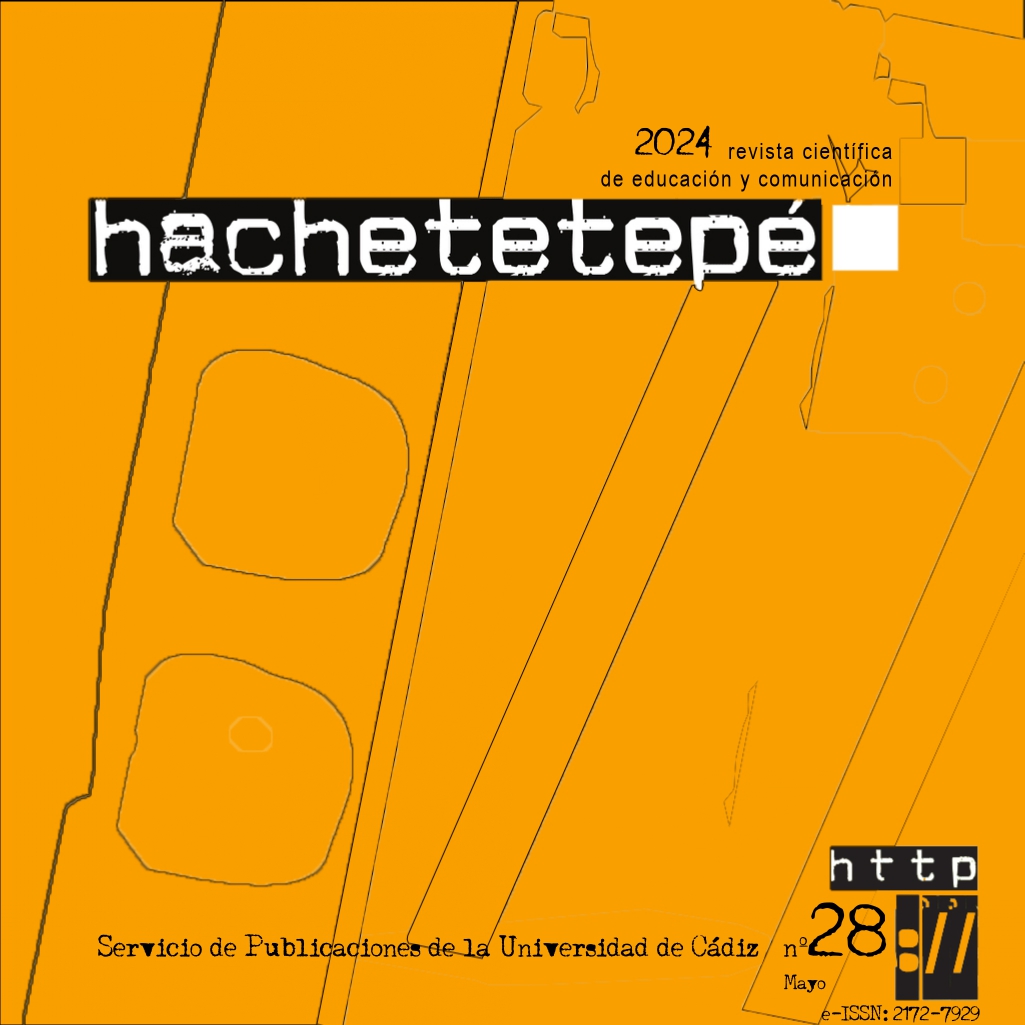Weaving connections: the transformative symbiosis between learning and Artificial Intelligence
Abstract
This article examines the convergence between artificial intelligence (AI) and human learning, exploring how this convergence redefines not only education, but also the technological landscape. AI, in its quest to emulate human intelligence, ventures into the realm of cognitive tasks once exclusive to human minds, such as reasoning and problem-solving. Machine learning, as an essential pillar of AI, enables autonomous improvement in the face of new situations, revealing the adaptive capacity of these technologies. Inspired by the structure of the human brain, neural networks and deep learning significantly enhance data processing capacity. In education, AI manifests itself through intelligent tutoring systems and personalized platforms that shape learning environments uniquely for each student. The creative crossroads highlights how AI, by understanding patterns, acts as an amplifier of human creativity. This convergence envisions a new educational era, characterized by complete personalization, technologically rich environments, and advanced assessments, while raising challenges that define an educational and technological future full of possibilities.Keywords
Downloads
How to Cite
License
Copyright (c) 2024 Oscar-Yecid Aparicio-Gómez, Carlos-Alfonso Aparicio-Gómez, Otto Federico von Feigenblatt

This work is licensed under a Creative Commons Attribution-NonCommercial-NoDerivatives 4.0 International License.
Those authors who have published with this journal, accept the following terms:
- They will retain their copyright and guarantee the journal the right to first publication of their work, which will simultaneously be subject to the Creative Commons Attribution License . They may be copied, used, disseminated, transmitted and publicly displayed, provided that the authorship, url, and magazine are cited, and are not used for commercial purposes. No derivative works are allowed.
- They may adopt other non-exclusive license agreements for the distribution of the published version of the work (e.g., deposit it in an institutional telematic archive or publish it in a monographic volume) provided that the initial publication in this journal is indicated.
- Disseminate your work through the Internet (e.g., in institutional telematic archives or on your website) once the manuscript is accepted, which may lead to interesting exchanges and increased citations of the published work. (See The effect of open access).
Hachetetepé. Scientific journal of education and communication does not charge a fee for the submission of manuscripts or for the publication of its articles.
References
Aparicio Gómez, O. Y., Ostos Ortiz, O. L., & Mesa Angulo, J. G. (2022). La convergencia de aprendizajes en el metaverso. Revista Interamericana de Investigación Educación y Pedagogía RIIEP, 15(2), 385–398. https://doi.org/10.15332/25005421.7879
Aparicio-Gómez, O.-Y., & Aparicio-Gómez, W.-O. (2021). Referentes filosóficos del proceso educativo. Revista Internacional de Filosofía Teórica y Práctica, 1(2), 157–168. https://doi.org/10.51660/riftp.v1i2.37
Carr, N. (2015). The glass cage: How our computers are changing the way we think, feel, and act. W. W. Norton & Company.
Chai, J. X., & Fan, K. K. (2018). Constructing creativity: Social media and creative expression in design education. Eurasia Journal of Mathematics, Science and Technology Education, 14(1), 33–43. https://doi.org/10.12973/ejmste/79321
Chiappe, A., & Lee, L. L. (2017). Open teaching: A new way on e-learning? Electronic Journal of E-Learning, 15(5), 369–383.
Comesaña-Comesaña, P., Comesaña-Comesaña, P., Amorós-Pons, A., & Alexeeva-Alexeev, I. (2022). Technocreativity, Social Networks and Entrepreneurship: Diagnostics of Skills in University Students. International Journal of Emerging Technologies in Learning (IJET), 17(5), 180–195. https://doi.org/10.3991/ijet.v17i05.28183
Domínguez, L. M. M. (2019). The essentials in human learning to respond to continuous change. Foro de Educacion, 17(27), 253–270. https://doi.org/10.14516/fde.638
Drewniak, Z., & Posadzińska, I. (2020). Learning and development tools in supporting of artificial intelligence companies innovativeness. Proceedings of the 15th European Conference on Management, Leadership and
Governance, ECMLG 2019, 125–132. https://doi.org/10.34190/MLG.19.082
Fan, L., & Chatterjee, S. (2018). Application of situational stimuli for examining the effectiveness of financial education: A behavioral finance perspective. Journal of Behavioral and Experimental Finance, 17, 68–75.
https://doi.org/10.1016/j.jbef.2017.12.009
Ferrer-Conill, R., Foxman, M., Jones, J., Sihvonen, T., & Siitonen, M. (2020). Playful approaches to news engagement. Convergence, 26(3), 457–469. https://doi.org/10.1177/1354856520923964
Fielding, M. (2016). Learning to be human: The educational legacy of John MacMurray. In Learning to be Human: The Educational Legacy of John MacMurray. Taylor and Francis Inc. https://doi.org/10.4324/9781315747934
Forbes-Riley, K., & Litman, D. (2010). Metacognition and learning in spoken dialogue computer tutoring. Lecture Notes in Computer Science (Including Subseries Lecture Notes in Artificial Intelligence and Lecture Notes in Bioinformatics), 6094 LNCS(PART 1), 379–388. https://doi.org/10.1007/978-3-642-13388-6_42
Gill, S. S., Xu, M., Patros, P., Wu, H., Kaur, R., Kaur, K., Fuller, S., Singh, M., Arora, P., Parlikad, A. K., Stankovski, V., Abraham, A., Ghosh, S. K., Lutfiyya, H., Kanhere, S. S., Bahsoon, R., Rana, O., Dustdar, S., Sakellariou, R., … Buyya,
R. (2024). Transformative effects of ChatGPT on modern education: Emerging Era of AI Chatbots. Internet of
Things and Cyber-Physical Systems, 4, 19–23. https://doi.org/10.1016/J.IOTCPS.2023.06.002
Hinojo-Lucena, F. J., Aznar-Díaz, I., Cáceres-Reche, M. P., & Romero-Rodríguez, J. M. (2019). Artificial intelligence in higher education: A bibliometric study on its impact in the scientific literature. Education Sciences, 9(1),1-9. https://doi.org/10.3390/educsci9010051
LeCun, Y., Bengio, Y., & Hinton, G. (2015). Deep learning. Nature, 521(7553), 436–444.
Mnih, V., Kavukcuoglu, K., Silver, D., Rusu, A. A., Veness, J., Bellemare, M. G., & Petersen, S. (2015). Human-level control through deep reinforcement learning. Nature, 518(7540), 529–533.
Nilsson, N. J. (1959). Learning machines: Foundations of computational intelligence. McGraw-Hill.
Nilsson, N. J. (1980). Principles of artificial intelligence (2nd ed.). Tioga Press.
OpenAI. (2020). Five years of progress in artificial general intelligence.
Rheingold, H. (1985). Tools for thought. MIT Press.
Schmidhuber, J. (2015). Deep learning in neural networks: An overview. Neural Networks, 61, 85–117.
Susnjak, T. (2022). ChatGPT: The End of Online Exam Integrity? https://acortar.link/XcG5py
Tegmark, M. (2017). Life 3.0: Being human in the age of artificial intelligence. Knopf.
van Dis, E. A. M., Bollen, J., Zuidema, W., van Rooij, R., & Bockting, C. L. (2023). ChatGPT: five priorities for research. Nature, 614(7947), 224–226. https://doi.org/10.1038/D41586-023-00288-7
von Feigenblatt, O., & Aparicio-Gómez, O.-Y. (2023). Trascending the eternal debate between traditional and progressive education: A constructive scholary dialogue. Octaedro.
Xie, H. (2023). The promising future of cognitive science and artificial intelligence. Nature Reviews Psychology, 2(4), 202. https://doi.org/10.1038/S44159-023-00170-3







